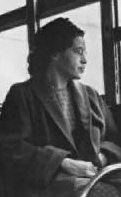Civil rights activist and reformer. Parks is best known for instigating the Montgomery bus boycott in 1955 in protest of segregation laws. Rosa Louise McCauley was born on February 4, 1913, in Tuskagee, Alabama. Her father, James, was a carpenter, and her mother, Leona, a teacher. Parks attended a liberal private school as an adolescent.
After briefly attending Alabama State University, she married Raymond Parks, a barber and activist, in 1932, and the couple settled in Montgomery, Alabama. Besides working as a seamstress and a housekeeper, Parks was involved in several African-American organizations. She served as secretary for her community chapter of the National Association for the Advancement of Colored People, and also worked for the Montgomery Voters League, the NAACP Youth Council, and other civic and religious groups.
The folklore surrounding the day of December 1, 1955, does not do Parks justice. Early accounts of the incident portray Parks as an ordinary, exhausted seamstress whose refusal to surrender her bus seat to a white passenger was purportedly unplanned and impulsive. To the contrary, Parks was a long-time protester of segregation laws, and she invoked the strength and struggles of her ancestors as she chose to keep her seat on the Montgomery bus. Parks was subsequently arrested for defiance and violation of segregation laws. The African-American community, inspired by Parks’s trial, began the famous Montgomery bus boycott on December 5, 1955. For 381 days, the majority of the African-American community refused to use public transportation, opting to walk, carpool, or even ride donkeys around the city.
On November 13, 1956, the Supreme Court declared that Alabama’s state and local laws requiring segregation on buses were unconstitutional. On December 20th federal injunctions were served on the city, enforcing the Court’s ruling on public transportation. For her role in the anti-segregation movement, Parks earned recognition as the “mother” or “midwife” of the civil rights revolution. In 1957, she and her husband moved to Detroit, Michigan, where they later founded the Rosa and Raymond Parks Institute for Self-Development, which prepares young African Americans for leadership positions in the workplace and the community. A subdivision of the Institute, called Pathways to Freedom, allows groups of teens to follow the Underground Railroad and visit the historical sites of the civil rights movement.
Parks and her husband still live in Detroit, spending their winters in Los Angeles. Her memoir, Quiet Strength, was published in 1994. In 1999, Parks received the Congressional Gold Medal from a bill widely supported by both houses of Congress.
